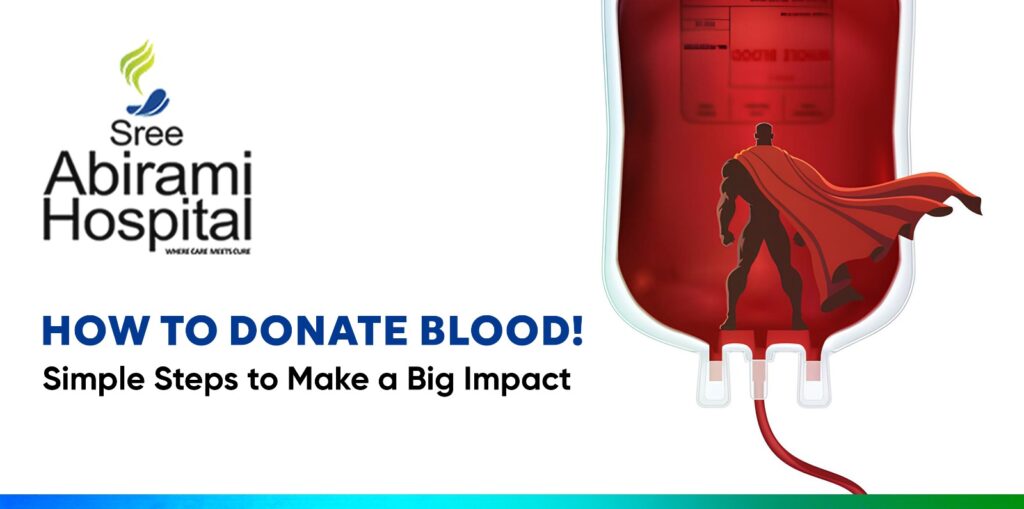
A little bit does go a long way. Giving blood is not only a great thing to do — it is an act of heroic selflessness that can be a life-saver. If you are a first-time donor or an occasional donor, the key is to have the assurance that you can safely give blood. Read this step-by-step guide so that you can be assured enough to make the move.
The Strength of One Pint
One pint of blood will save three lives. That simple fact alone is enough to make donating blood of the utmost importance. Don’t go and go and do it yet, however, one must prepare, learn what the process is, and what will occur.
Your Roadmap: How to Donate Blood in 5 Simple Steps
Let’s get this right.
1. Check Eligibility First
- Not everyone is eligible to donate blood. You must:
- 18–65 years (16–17 years with parental consent in certain districts)
- Scale at least 50 kg
- Be free from infection or chronic disease
- Blood donated in the previous 90 days (whole blood)
- Call your physician or local blood bank if in doubt.
2. Prepare the Right Way
- Preparation is done a day before that.
- Water up—water supplies your veins with plenty of fluids and makes blood circulate more freely.
- Have a healthy meal with iron content (eggs, lentils, spinach) rather than oily food.
- Sleep well the previous night.
These soft movements increase your sense of relaxation and prevent dizziness during donation.
3. Registration and Screening of Health
When you get to the donation site:
- Fill in a form with a few details.
- And then, of course, there is the medical check—pulse rate, blood pressure, haemoglobin level, and overall health.
This safeguards you and the recipient.
4. The Donating Process
It’s here! It literally takes 8–10 minutes to actually perform the blood draw. You will have a sterile needle that will be inserted to extract about 350–450 ml of blood. You will be reclining or sitting comfortably and the staff will be observing you while the procedure is being performed.
Relax, take deep breaths, and even listen to some soothing music.
5. Recovery and Refreshments
After donating, you will lie down for 10–15 minutes of rest. Juice or snacks may be provided to you to keep you energized. Rest for the rest of the day and keep drinking fluids.
How Soon Can You Give Again?
- Whole Blood: Every 3 months
- Platelets: Every 2 weeks
- Plasma: every 28 days
This rotation provides your body with plenty of time to recover with the possibility of volunteering on a frequent basis.
Why It Matters: Beyond the Needle
Donating is not how-to donating—donating is being a part of a process to provide life. Hospitals require volunteer donors for surgical patients, cancer patients, trauma, and so on.Your donation may be the reason why a family is given a second chance.
Where Do You Donate Blood?
- Government and private hospitals
- Mobile donation drives or blood banks
- Red Cross or any other related NGOs
- University or business blood drives
A simple internet search using “blood donation near me” will also lead you to the closest centre.
Tips for First-Time Donors
- Dress in comfortable clothing with roll-up sleeves. Inform the nurse if you’re nervous—they’ll guide you calmly.
- Unwind and stay positive—your head is as valuable as your body.
- Donating blood safely is something you’ll learn so you can come back again and again with ease.
Your Small Act, Their Second Chance
Blood cannot be produced—only by kind individuals such as yourself. By giving blood, you are not donating to a person; you are maintaining the whole health system afloat.
Be the reason for someone living today.
FAQs: Rapid Answers for Questioning Contributors
- Is donating blood painful?
- No, it’s sort of embarrassing—like a little pinch—but not that painful.
- Can I donate if I have a tattoo?
- Yes, if your tattoo is 6 months or more and from a licensed shop.
- What not to do after giving blood?
- Will not consume alcohol, excessive exercise, and cigarettes for 24 hours.
- How long does the blood take to get re-oxygenated?
- Platelets and plasma are replenished in days; red cells in weeks.
- Is it safe to donate blood while menstruating?
- Yes, provided otherwise healthy and provided your haemoglobin is normal.

